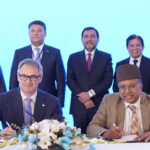Awaaz-e-Sehat: Empowering Maternal Healthcare with Voice-Enabled Electronic Record Management, a ground-breaking project by Dr. Maryam Mustafa, Director of the Saida Waheed Gender Initiative and Assistant Professor of Computer Science at LUMS, was recently presented at the 78th United Nations General Assembly. She spoke during a session titled “Artificial Intelligence for Accelerating Progress on the Sustainable Development Goals: Addressing Society’s Greatest Challenges.”
After competing against more than 1,300 international submissions for the Grand Challenges Catalysing Equitable Artificial Intelligence (AI) Use prize, Dr. Mustafa’s research was chosen as the winner and received a prestigious grant from the Bill & Melinda Gates Foundation. Dr. Hassan Mohy Ud Din (Project Co-PI, LUMS), Dr. Beena Ahmed (Project Co-PI, UNSW), and Dr. Fozia Umber (Project Co-PI, Shalamar Hospital) are working with her on this significant project.
The lack of written medical records for expecting women seeking care offers a difficult barrier for healthcare workers in a country that struggles with dismal pregnancy outcomes. This knowledge gap severely limits the ability of medical professionals to provide accurate diagnoses and individualized care, which should ideally take socioeconomic and lifestyle factors—important drivers of maternal health outcomes—into account. Awaaz-e-Sehat, a voice-enabled, mobile phone-based, conversational AI assistant, is being developed by Dr. Mustafa and her committed team. By enabling them to develop and maintain thorough electronic medical records, this cutting-edge program intends to give Pakistani maternal healthcare professionals more control.
A proof-of-concept system made up of an easy-to-use user interface, a speech recognition module, and a text recognition module is used by Awaaz-e-Sehat to work by capturing audio answers in various languages in response to specified prompts. The system then converts these responses into text and inserts them into an electronic medical record template in Urdu. At Shalamar Hospital in Lahore, where it will be used to gather data on 500 patients, maternal healthcare professionals will assess the system’s efficacy.
The urgent need to improve maternal health outcomes in Pakistan is what motivates Dr. Mustafa’s research proposal. In order to address her worries, she said, “Our country has some of the poorest pregnancy outcomes globally, a condition substantially worse than many other low-income nations. In sharp contrast to the average of just 12 fatalities per 100,000 in affluent nations, Pakistan’s maternal mortality rate is 186 deaths for every 100,000 live births. In Pakistan, the maternal healthcare system is chronically underfunded and does not have any equipment to facilitate electronic record-keeping.
Dr. Mustafa envisions Awaaz-e-Sehat being widely implemented throughout Pakistani maternal healthcare facilities, highlighting its potential to not only improve patient care but also create crucial datasets for training diagnostic AI tools intended to address maternal health issues in the nation.







